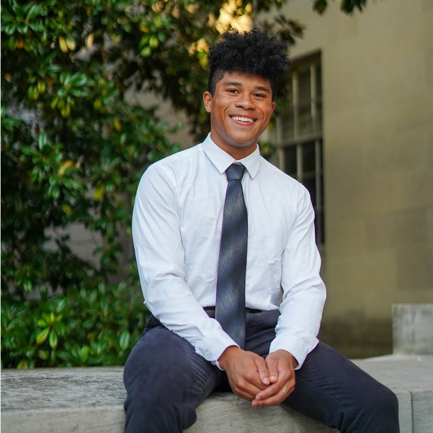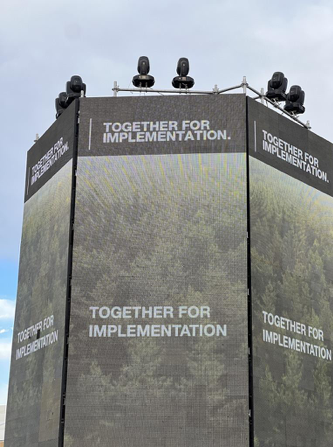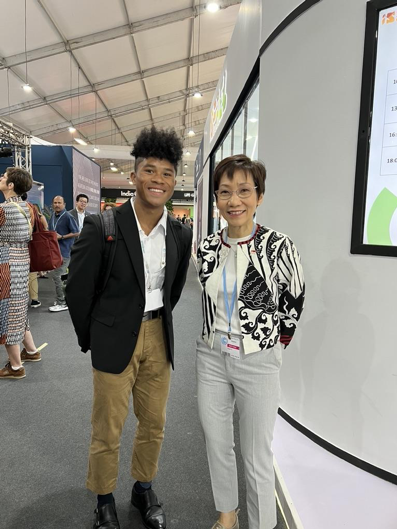 By Christian Chung
By Christian Chung
Christian Chung is a junior at UNC-Chapel Hill double majoring in Biology and Public Policy. Christian is a Light on the Hill Scholar and an Environmental Policy Intern with the North Carolina Collaboratory.
My COP 27 Experience as a Student Youth Delegate
Annually, the United Nations hosts a climate change summit to engage global stakeholders in climate-related policy discourse and negotiate and economically scale integrated initiatives to combat climate displacement and insecurity. This past November, I had the extraordinary opportunity of attending COP 27, the United Nations Climate Change Conference, in Sharm El-Sheikh, Egypt. With the recollection of the Paris Agreement, actors from both public and private sectors from across the globe met with hopes of upholding the international treaty, as well as defining new target goals for climate action.
Before my departure, I honestly did not know what to expect from attending a COP conference; however, this year’s theme, ‘Together for Implementation,’ truly set the summit’s tone. Just by stepping foot onto a COP electric transport shuttle, I was spirited with inspiring conversations from knowledgeable climate professionals and experts such as Kathryn Alsegaf, Chief Sustainability Officer of Deloitte, about ongoing actions to protect our planet’s future, as well as exchange life experiences with other advocates. With a venue fit for over 35,000 attendees, I was optimistically overwhelmed by the essence of global cooperation and commitment to addressing climate change, especially with the engagement of youth. As I’ve grown to learn, climate change is a highly generational issue, disproportionately impacting younger people than current adults. With a growing youth voice and urgency for nation-states to integrate ‘just transitions,’ I am confident in upcoming sustainable changes and increasing ambition to meet fulfill existing and future climate agreements.

Financing a Fair and Integrated ‘Just Transition’
During my week at the conference, while I was enthusiastic about talks of new climate commitments and offensive approaches to limit global heating to 1.5°C, I was not naive to the “greenwashed” agendas of various world leaders. Logistical concerns remain regarding implementing climate-conscious measures that would equitably reduce greenhouse gas emissions; mitigate risk, loss, and damage; and build and maintain resilient and adaptive infrastructure; all of which are significant characteristics of a proposed ‘just transition.’ Geopolitical and time constraints pose as limiting factors to achieving successful ‘just transitions;’ however, the issue of sourcing a mechanism to finance said ‘just transition’ is most pressing.
It was refreshing to observe policymakers focus on accountability when establishing partnerships, and I hope themes of integrity and inclusivity persist at future conferences.
Utilizing the public sector to appeal to its constituency is one piece of the puzzle. Still, without complaint and sustained private sector investment, the affordability of a ‘just transition’ is left solely within decision-makers’ imaginations. With respect to Article 6 of the Paris Agreement, a clause dictating voluntary cooperation between countries to achieve emission reduction targets, there is an apparent need to expand upon this model to be inclusive and beneficial for private sector firms that want to involve themselves in joint integrated development projects with government institutions. At the base level of a ‘just transition’ is the existing loss and damage done to the environments and economies of developing countries.
Because developing nation-states are less capable of financing transitions to clean energy or sustainable processes, integrity is vital in holding well-off countries accountable for assisting those they might have disrupted while obtaining said wealth. It was refreshing to observe policymakers focus on accountability when establishing partnerships, and I hope themes of integrity and inclusivity persist at future conferences.

Is COP Effective as an International Institution?
In final remarks, I certainly would not trade my experience at COP for anything. It was exhausting, but I took immense knowledge and personal realizations from the conference that will serve as a basis for aspiration. The intentions behind holding an annual COP conference are just what the world needs to take a unified and integrated stance against climate-related challenges. Although it may seem that some current world leaders approach climate policy more seriously than others, I still remain hopeful for the future, especially from a youth perspective.
Climate change is not one-sided; simply because someone else’s situation might not directly affect you does not mean it is not an issue! It is clear that members of my generation are ready, if not already doing major things, to change the tide of the climate crisis, and I am more motivated than ever to support those in their fight to preserve our planet.

